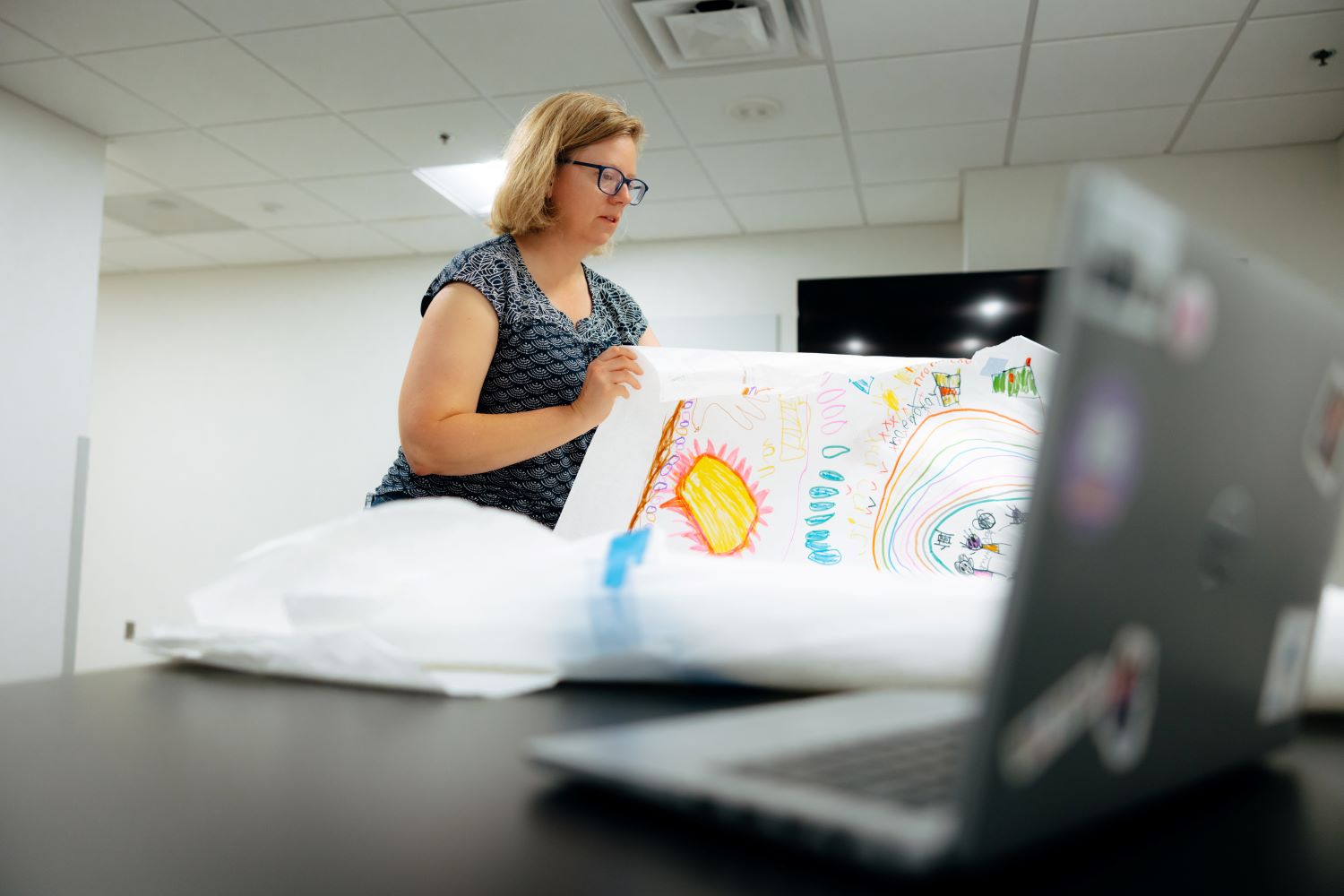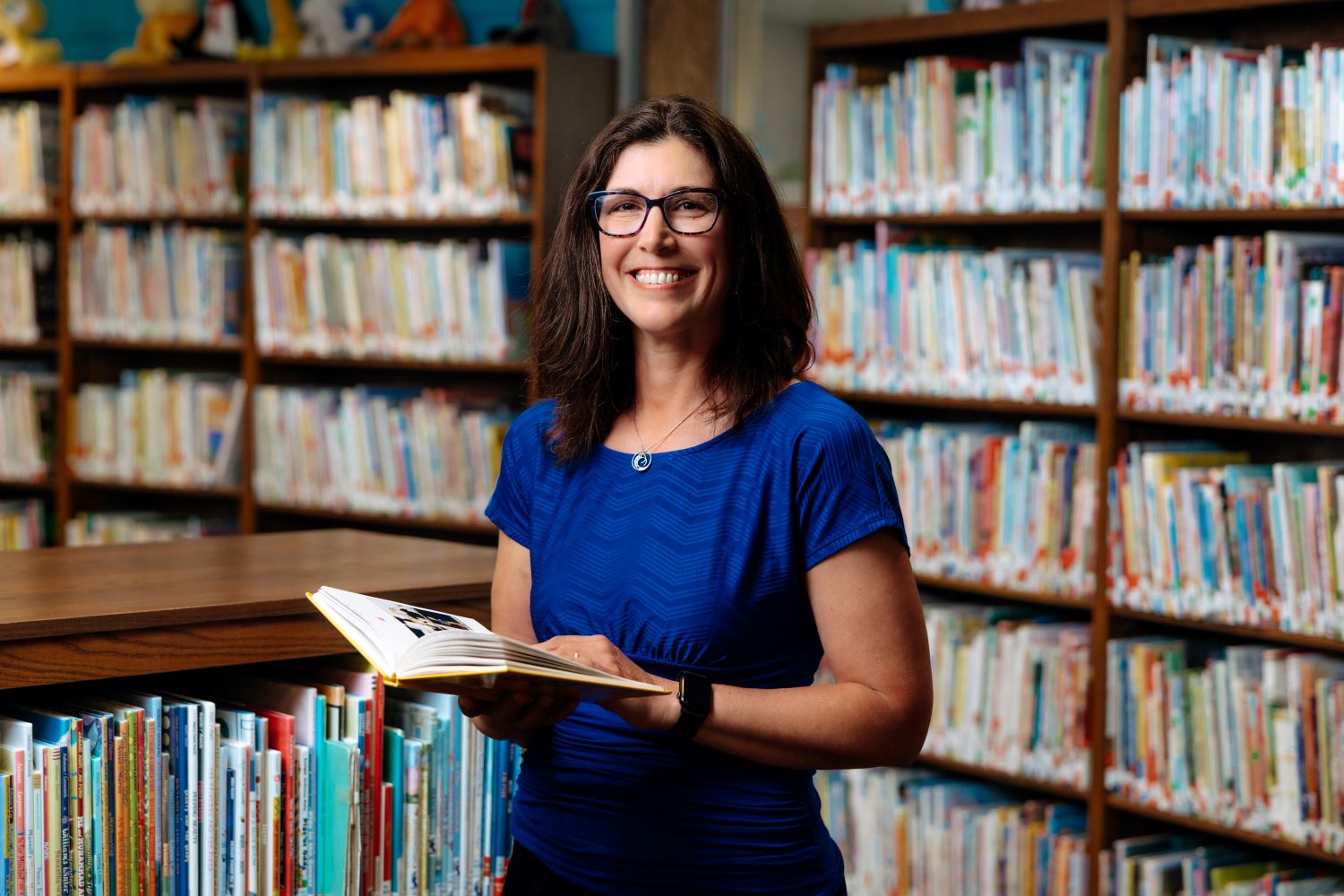Summer Scholarship
Scholarly Spotlight
For more than a decade, summer has meant something different for some University of Northern Iowa faculty members. It’s a chance to strengthen their scholarly insight, thanks to the support of College of Education Summer Fellowships.
Soh Meacham, associate dean of graduate studies and research, explains that up to 10 faculty members are selected as fellows each summer. Awards of $4,000 each fund the development and continuation of research projects and scholarly writing.
“Providing the fellowship helps faculty members to keep on working on their research and deepen their scholarship,” Meacham says.
The promise of 'Big Paper'
 Among recent fellows were Amy Staples, associate professor of special and inclusive education, and Sarah Vander Zanden, head, Literacy, Early Childhood and Special Education. They continued their collaborative work on a project called “Big Paper.” The study examines how young children — specifically kindergartners — compose during Big Paper, an inclusive, whole-group, multilevel writing activity designed for early learners.
Among recent fellows were Amy Staples, associate professor of special and inclusive education, and Sarah Vander Zanden, head, Literacy, Early Childhood and Special Education. They continued their collaborative work on a project called “Big Paper.” The study examines how young children — specifically kindergartners — compose during Big Paper, an inclusive, whole-group, multilevel writing activity designed for early learners.
Staples and Vander Zanden were particularly interested in how the activity supports students as they transition from graphic to text-based composition. They also wanted to explore how students develop a sense of authorship by supporting and collaborating with one another.
In spring 2024, a Big Paper session was held once a week in a kindergarten classroom, with that number doubling this past academic year. Staples and Vander Zanden also observed writing instruction weekly in two classrooms.
During the summer, their fellowship allowed them focused time to analyze preliminary data, refine research questions and plan for the coming school year.
“This fellowship was professionally invigorating and energizing,” Vander Zanden says. “It supported us financially and professionally. A portion of faculty work is dedicated to research, but during the academic year, often the significant focus is on teaching. Analysis in a chunk of dedicated time was really productive — it allowed for focus and lots of collaboration.”
One major outcome of their summer work was the collaborative design of data collection protocols. Through their analysis, Staples and Vander Zanden identified three key areas to guide their focus: students, teachers and classroom spaces/practices.
The duo continued their work on Big Paper with another summer fellowship in 2025, analyzing student compositions and presenting their findings at the Iowa Reading Conference in June.
“The enthusiasm and natural authorship that occurs when students are truly free to communicate what they wish, how they wish and with whom they wish has held my interest for years,” Staples shares. “Students learn what matters to them and their peers, and teachers get to be an appreciative audience. From the COE Summer Fellowship, I enjoyed the gift of uninterrupted time to dig into the data and work collaboratively with Sarah to understand what it all meant.”
Our scholarship is valuable for the College of Education because it supports interdisciplinarity, encourages partnership with local schools and expands inquiry of an approach with previous promise.”
Defining 'age appropriate'
 Another summer fellow, Joan Bessman Taylor, conducted research on “Age- appropriate as a Guiding Principle for Libraries” — an exploration of how the term “age appropriate” is used when selecting books for youth. In today’s climate of book banning attempts — often driven by concerns that children might read the “wrong” books — the term has taken on new weight.
Another summer fellow, Joan Bessman Taylor, conducted research on “Age- appropriate as a Guiding Principle for Libraries” — an exploration of how the term “age appropriate” is used when selecting books for youth. In today’s climate of book banning attempts — often driven by concerns that children might read the “wrong” books — the term has taken on new weight.
“Despite its ubiquitous use as a term, and the assumption that everyone understands what it means, I could find no singular definition in the foundational literature of library and information science,” explains the associate professor of school library studies. “This made me want to investigate further to see who meant what by its use.”
Her research so far revealed significant differences across the fields of library science, education and law in how “age appropriate” is applied to book selection.
“While most legislation relying on the term refers solely to the chronological age of a hypothetical reader, education considers cognitive and emotional variation among children of the same chronological age; cites the various reading needs of those served based on grade level, instructional level and independent reading level; and recognizes these as potentially different from each other even when describing the same reader,” Taylor says.
The findings are already informing her teaching of future teacher-librarians as they explore book selection, cataloging, advocacy for library collections and supporting diverse readers across age spans and abilities.
Being a summer fellow gave her the opportunity to devote focused time to this work.
“It reminds me of the reasons I wanted to become an academic,” Taylor says. “It allows me to think deeply and uninterruptedly about things that matter to my discipline and to concerns beyond our institution. It takes me outside the mundane but necessary tasks that dominate my work and re-centers me.”
Summer 2025 Fellows
Morgan Anderson, “Smartphones in Schools: Exploring Student Experiences of Attention”
Gregory Bourassa, “Revolutionary Education: A Challenge to Capitalist Schooling and the Organization of Being”
Suzanne Freedman, “The Long-Term Impact of a Forgiveness Intervention on a Sample of Incest Survivors’ Emotional and Psychological Well-Being: A Thirty-Three- Year Follow-up”
Tara Tedrow, “An Exploration of Trauma-Informed Pedagogy in Special Education Teacher Preparation: A Scoping Review”
Carolyn Weber, “The Collaborative Writing of a Course in Citizenship”
